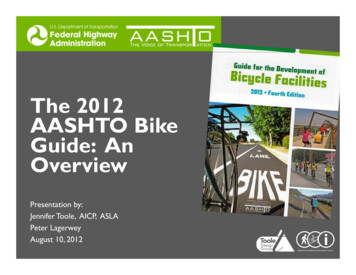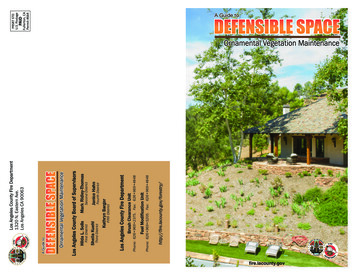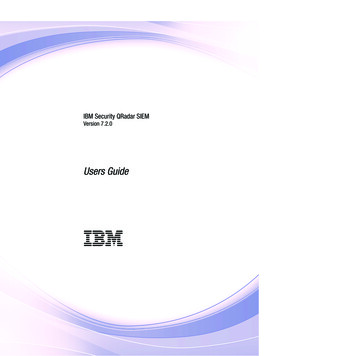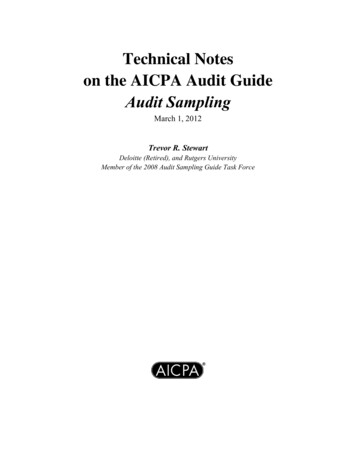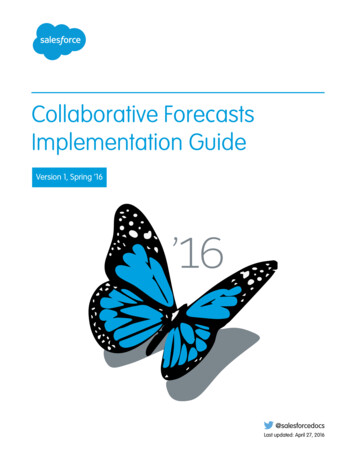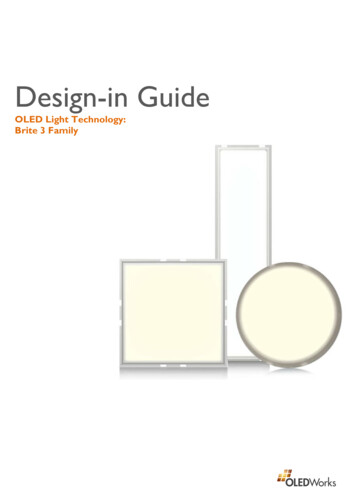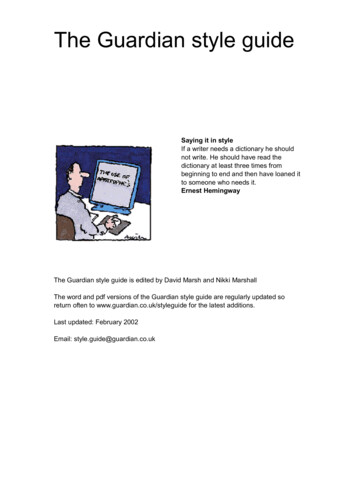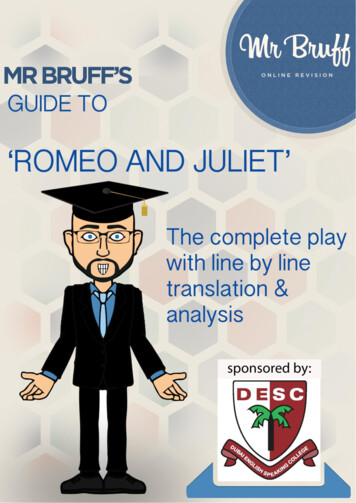
Transcription
1
CONTENTS:Part 1: The Origins of the Play 7Part 2: Translating the Prologue 8Part 3: Analysing the Prologue 9Part 4: Translating Act 1 Scene 1 12Part 5: Analysing Act 1 Scene 1 30Part 6: Translating Act 1 Scene 2 32Part 7: Analysing Act 1 Scene 2 40Part 8: Translating Act 1 Scene 3 41Part 9: Analysing Act 1 Scene 3 50Part 10: Translating Act 1 Scene 4 52Part 11: Analysing Act 1 Scene 4 61Part 12: Translating Act 1 Scene 5 63Part 13: Analysing Act 1 Scene 5 77Part 14: Translating Act 2 Scene 1 80Part 15: Analysing Act 2 Scene 1 86Part 16: Translating Act 2 Scene 2 88Part 17: Analysing Act 2 Scene 2 105Part 18: Translating Act 2 Scene 3 107Part 19: Analysing Act 2 Scene 3 115Part 20: Translating Act 2 Scene 4 117Part 21: Analysing Act 2 Scene 4 136Part 22: Translating Act 2 Scene 5 138Part 23: Analysing Act 2 Scene 5 145Part 24: Translating Act 2 Scene 6 147Part 25: Analysing Act 2 Scene 6 1512
Part 26: Translating Act 3 Scene 1 153Part 27: Analysing Act 3 Scene 1 172Part 28: Translating Act 3 Scene 2 176Part 29: Analysing Act 3 Scene 2 188Part 30: Translating Act 3 Scene 3 190Part 31: Analysing Act 3 Scene 3 206Part 32: Translating Act 3 Scene 4 208Part 33: Analysing Act 3 Scene 4 212Part 34: Translating Act 3 Scene 5 214Part 35: Analysing Act 3 Scene 5 235Part 36: Translating Act 4 Scene 1 237Part 37: Analysing Act 4 Scene 1 247Part 38: Translating Act 4 Scene 2 249Part 39: Analysing Act 4 Scene 2 254Part 40: Translating Act 4 Scene 3 256Part 41: Analysing Act 4 Scene 3 261Part 42: Translating Act 4 Scene 4 263Part 43: Analysing Act 4 Scene 4 266Part 44: Translating Act 4 Scene 5 267Part 45: Analysing Act 4 Scene 5 280Part 46: Translating Act 5 Scene 1 282Part 47: Analysing Act 5 Scene 1 289Part 48: Translating Act 5 Scene 2 291Part 49: Analysing Act 5 Scene 2 294Part 50: Translating Act 5 Scene 3 295Part 51: Analysing Act 5 Scene 3 3203
A WORD FROM OUR WONDERFUL SPONSORS:Dubai English Speaking College (DESC) is a British overseas school, based inDubai, with over 960 students and follows the National Curriculum of Englandand Wales. Providing an excellent all-round experience for students aged 1118yrs, both within and beyond the classroom, is the most important aim of theschool . Where the extracurricular life of the College is concerned, there aremany opportunities that enable students to be active participants, compete,work effectively with others and develop their leadership skills. A lively Housecommunity with four Houses: Desert, Earth, Sky and Coast provides pastoralsupport and the College is rated 'Outstanding' (Source: Dubai SchoolsInspection Bureau).Website: http://www.descdubai.com/English is an exciting, creative and thought-provoking subject at all ages andprovides so many individuals with life-long learning and a passion for literatureand language. For some, it becomes, or plays, a key role in their occupation. AtDESC, we have a Department that is passionate about all things relating tospeaking, listening, reading, writing and thinking, to encourage young people tobe independent, confident and resilient learners; to aspire to reach their fullpotential and to enjoy learning and developing communication skills; thecornerstones of building personal relationships and being successful in allaspects of life. Mr Bruff’s resources are perfect to promote independentlearning for students and they are incredibly popular. Be amazing - enjoyEnglish!4
DEDICATION:I would like to start this eBook by thanking those who have helped andsupported along the way:My wife, Claire, who patiently lost me to the laptop for the duration of writing.Hannah and Molly Payne: two awesome girls who inspire me with their love oflearning.Sunny Ratilal, who designed the front cover of this and my previous eBook.Joan Waters, who helped me out tremendously with proof reading.And to those who helped out financially by pre-ordering the book before it wascomplete:Andy Pealing, Craig Farr, Laura Driggers, Abir Wahich, Tomas Rafter, CarolineTetley, Ronald Ani-Adeji, Lydia Oliver, Ntobeko Ndlovu, Mark Blything, AnneCook, Rachel Reid, Judy Bundy, Charles Goss, Katherine Gregory, MarinaJeffery, Joan Waters, Judith Blake, Andrew Cartwright, Alison Shea, KathyDarlinson, G Cheeseman, Sharon Sephton, Guyan Mitra, Claire Duesbury, EmmaLashmar, Jitesh Jassal, Mark Terry, Paul Roberts, William Connelly, TalorMacSween, Sonia Wilkes, Yvonne Schofield, Beverley Smith, Madeleine Stewart,Aphrodite Kokosioulis, Lousie Dodd, Hilary Holden, Lauren Adamson, StephenGrist, John Reid, Kay Patterson and the wonderful Annemarie Payne.5
IntroductionWilliam Shakespeare’s ‘Romeo and Juliet’ is one of the most widely studiedtexts in the world. However, despite its popularity, very few students are ableto understand the text in its entirety; Shakespeare’s use of language wasextremely complex and this makes his work both a challenge and a huge rewardfor those who study it. Many teenagers will fall in love with literature throughstudying Shakespeare’s work, but for others it will be the final nail in the coffinthat turns them away from reading for pleasure. My aim for this eBook is toshow you the beauty of Shakespeare’s writing.In this revision guide I translate the complete text into modern English. Thismeans taking all 25,000 words and re-writing them in a way that would be easyto understand for a modern teenager or young adult. Many people tell me thatthe success of my YouTube videos (over 1 million views and counting) is duelargely to the way I make complex concepts easy to understand. In this eBook Iuse that skill-set to re-write the play in a way that will allow anyone to graspwhat is going on. However, I don’t stop there. For every scene, I analyse keyelements of language, structure and form, which are the key assessment foci ofall GCSE and A-Level English Literature courses. Perhaps most exciting of all,the writing is interspersed with links to dozens of videos where I analyse thetext. This gives you the unique opportunity to choose between reading my work,listening to it or watching it take place via video.If you find this revision guide useful then please visit youtube.com/mrbruffwhere you will find hundreds of videos focusing on English and EnglishLiterature. My videos have been viewed over 1 million times across 198 nations –I’d love you to join in.I have also written a bestselling eBook revision guide for GCSE English andEnglish Literature, which can be bought at both http://www.mrbruff.com/buyand http://www.amazon.co.uk/dp/B00BNWVXC8If you wish to get in touch with me then please do email me at abruff@live.co.ukAndrew BruffMarch 20146
PART 1: THE ORIGINS OF THE PLAYBased on the video http://youtu.be/TSE04T8fctsAlthough many students assume that William Shakespeare created the storylineof ‘Romeo and Juliet’, the truth is that it was someone else who came up withthe original plot.The Italian writer Matteo Bandello (1480-1562) is the original creator of whatwe now know as ‘Romeo and Juliet’. He wrote the short story ‘Giullette e Romeo’,supposedly based on a true life story which had taken place in his home countryof Italy (hence the Italian setting of Shakespeare’s play). In 1562 the Englishpoet Arthur Brooke translated the short story into a poem (along with somesmall plot changes which affected minor characters such as the Nurse and theFriar). Brooke died a year after publication and the now classic tale was pickedup by the English novelist William Painter, who adapted it into a novel entitled‘The Palace of Pleasure’ (1567). Finally, around the year 1590, WilliamShakespeare adapted the story for the stage, writing the play ‘Romeo andJuliet’. In the 400 years that followed, the play would go on to become one ofthe best known stories in the world.7
Part 2: TRANSLATING THE PROLOGUEBased on the video http://youtu.be/9TVEOlPSeRgORIGINAL TEXT:The PrologueMODERN TRANSLATION:(An introductory speech)Two households, both alike in dignity,Two families, both equally good & honourable,In fair Verona, where we lay our scene,In the Italian city of Verona, where the playtakes place,From ancient grudge break to new mutiny,An old resentment will once again start up,Where civil blood makes civil hands unclean.Where the public will end up joining in thefight.From forth the fatal loins of these two foesFrom the children of these two enemyfamiliesA pair of star-cross'd lovers take their life;Two fated lovers will kill themselves;Whose misadventured piteous overthrowsFollowing the events which keep them apartDo with their death bury their parents' strife.The lovers’ deaths bring the familiestogether.The fearful passage of their death-mark'd love,The events which lead to the lovers’ suicide,And the continuance of their parents' rage,And the war between the families,Which, but their children's end, nought couldWhich only stopped when the lovers died,remove,Is now the two hours' traffic of our stage;Is what this two hour play is all about;The which if you with patient ears attend,If you listen carefully,What here shall miss, our toil shall strive tomend.8Anything you’ve missed from thisintroduction will be explained to you.
PART 3: FORM ANALYSIS: PROLOGUE AS SONNETBased on the video http://youtu.be/B0wtMTRld5kUnderstanding what we are being told in the prologue is just one part of thepuzzle; the next challenge is to examine the form in which it is written.THE SONNET FORM:The sonnet is a genre of love poetry which originated in Italy in the 13thCentury. The 14th Century poet Petrarch is the most recognised Italiansonneteer. Falling in love with a woman known only as ‘Laura’, he wrote 366sonnets to her.The Italian sonnet follows a strict form: 14 lines The first 8 lines (known as the octave) present a problem The last 6 lines (known as the sestet) present a solution to the problem Line 9 (known as the Volta) introduces a sharp twist, or turn, which bringsabout the move to the resolution ABBA ABBA rhyme scheme.THE SHAKESPEAREAN SONNETIn the 16th Century, the sonnet made its way into English poetry. Sir PhilipSidney developed it, but it came to be known as the Shakespearean sonnet(after Shakespeare made it truly famous). This form is quite different to thePetrarchan sonnet: It is written in iambic pentameter (lines of 10 syllables, with alternatingstressed and unstressed syllables). It is divided into 3 verses of four lines each, known as ‘quatrains’, andfinished with a rhyming couplet which also served as the Volta. Its rhyme scheme is also different: ABAB CDCD EFEF GG.A close look at the prologue will reveal that it is, in fact, a Shakespeareansonnet:9
The prologue isdivided into 3verses of fourlines each, knownas ‘quatrains’, andfinished with arhyming coupletwhich also servedThe PrologueTwo households, both alike in dignity,In fair Verona, where we lay our scene,From ancient grudge break to new mutiny,Where civil blood makes civil hands unclean.as the Volta.The prologue iswritten iniambicpentameter(lines of 10syllables, withalternatingstressed andunstressedsyllables).From forth the fatal loins of these two foesA pair of star-cross'd lovers take their life;Whose misadventured piteous overthrowsDo with their death bury their parents' strife.The wordshighlightedyellow are wordswe would expectto see in a lovepoem: thelanguage ofThe fearful passage of their death-mark'd love,And the continuance of their parents' rage,Which, but their children's end, nought could remove,romance.Theprologuehas therhymeIs now the two hours' traffic of our stage;The which if you with patient ears attend,What here shall miss, our toil shall strive to mend.10scheme:ABAB CDCDEFEF GG
AnalysisAlthough Shakespeare adopted the form of a romantic love poem, he filled itwith the language of hate and conflict (see the words highlighted in green) tosymbolise how the play was to be a mixture of both love and conflict. Perhapsthe intertwining of the two symbolises the idea that it is impossible to have theone without the other: Shakespeare seems to be suggesting that love and hateare joined together. This interpretation would tie in with many critics who seethe major theme of the whole play as being a reflection of how humans areneither wholly good nor wholly bad, but a complex mix of the two. Whatever thereason, it is no coincidence that Shakespeare, only two minutes into the play, isintelligently mixing form with language to present his theme.11
PART 4: TRANSLATING ACT 1 SCENE 1Based on the video http://youtu.be/Wpl2j9wKDuQORIGINAL TEXTScene 1. Verona. A public place.MODERN TRANSLATIONScene 1. A public area in the Italian city ofVerona.Enter SAMPSON and GREGORY, of theSAMPSON and GREGORY, two of the Capulethouse of Capulet, armed with swords andmen, enter armed with weapons.bucklers.SAMPSONSAMPSONGregory, o' my word, we'll not carry coals.Gregory, we will not put up with insults.GREGORYGREGORYNo, for then we should be colliers.No, for that would make us worthless (likecoal-miners).SAMPSONSAMPSONI mean, an we be in choler, we'll draw.If I am angered I will pull my sword out.GREGORYGREGORYAy, while you live, draw your neck out o'Yes, but you should try to avoid conflict.the collar.SAMPSONSAMPSON:I strike quickly, being moved.If I am angered I will attack quickly.GREGORYGREGORY:But thou art not quickly moved to strike.But you don’t quickly get angry.SAMPSON:SAMPSON:A dog of the house of Montague movesThose idiot Montagues make me angry.12
me.GREGORYGREGORY:To move is to stir; and to be valiant is toBy being moved to action you are backing offstand: therefore, if thou art moved, thouand running away. Brave people just stand stillrunn'st away.and unafraid.SAMPSONSAMPSON:A dog of that house shall move me toAny of those stupid Montagues will make mestand: I will take the wall of any man orfight. I will treat the Montagues as inferior bymaid of Montague's.taking the wall with their men (taking thesuperior position when walking down thestreet).GREGORYGREGORY:That shows thee a weak slave; for theWell then you are weak, as only weak people goweakest goes to the wall.to the wall (this is a pun on how women arepushed up against walls to have sex).SAMPSONSAMPSON:True; and therefore women, being theYou’re right; women are always being pushed upweaker vessels, are ever thrust to theagainst the wall, so I will push Montague’s menwall: therefore I will push Montague'saway from the wall and have sex with hismen from the wall, and thrust his maidswomen up against it.to the wall.GREGORYGREGORY:The quarrel is between our masters andThe argument is between the men of theus their men.families- leave the women out of it.SAMPSONSAMPSON'Tis all one, I will show myself a tyrant:It’s all the same - I will fight the men and takewhen I have fought with the men, I will be the virginity of the women.13
cruel with the maids, and cut off theirheads.GREGORYGREGORYThe heads of the maids?Take their lives?SAMPSONSAMPSONAy, the heads of the maids, or theirYes, their lives or their virginities - take it howmaidenheads; take it in what sense thouyou like it.wilt.GREGORYGREGORYThey must take it in sense that feel it.It’s the women who must take it.SAMPSONSAMPSONMe they shall feel while I am able toThe women will feel me for as long as I canstand: and 'tis known I am a pretty piecekeep it up. Everyone knows I am well endowed.of flesh.GREGORYGREGORY'Tis well thou art not fish; if thou hadst,It’s good you are not a fish. If you were youthou hadst been poor John. Draw thy tool!would be salted and dried. Get your weaponhere comes two of the house of theout! Here come two of the Montagues.Montagues.SAMPSONSAMPSONMy naked weapon is out: quarrel, I willMy sword is out: fight, I’ve got your back.back thee.GREGORYGREGORYHow! turn thy back and run?How! By running away?SAMPSONSAMPSONFear me not.No need to worry about me.GREGORYGREGORY14
No, marry; I fear thee!No, I am afraid of you!SAMPSONSAMPSONLet us take the law of our sides; let themLet’s keep it lawful; let’s provoke them to startbegin.the fight so that we can’t be blamed for it.GREGORYGREGORYI will frown as I pass by, and let themI will pull a stupid face at them as they go by,take it as they list.and let’s see how they react.SAMPSONSAMPSONNay, as they dare. I will bite my thumb atNo, I will bite my thumb at them (a modernthem; which is a disgrace to them, if theyequivalent would be somewhere along the linesbear it.of ‘sticking your fingers up’ at someone,although this original insult is very sexual). Ifthey don’t react then it will show them up.Enter ABRAHAM and BALTHASAREnter ABRAHAM and BALTHASARABRAHAMABRAHAMDo you bite your thumb at us, sir?Are you making an insulting gesture at me?SAMPSONSAMPSONI do bite my thumb, sir.I am making a gesture.ABRAHAMABRAHAMDo you bite your thumb at us, sir?Is it directed at us?SAMPSONSAMPSON[Aside to GREGORY] Is the law of our(quietly to Gregory) If I say ‘yes’ will we stillside, if I say ay?be able to escape blame if this ends up in afight?GREGORYGREGORYNo.No.15
SAMPSONSAMPSONNo, sir, I do not bite my thumb at you, sir, No. I am making a gesture but it is notbut I bite my thumb, sir.directed at you.GREGORYGREGORYDo you quarrel, sir?Do you want a fight?ABRAHAMABRAHAMQuarrel sir! no, sir.Fight! No.SAMPSONSAMPSONIf you do, sir, I am for you: I serve asI am quite happy to fight if you want to - mygood a man as you.boss is just as great as yours.ABRAHAMABRAHAMNo better.No better.SAMPSONSAMPSONWell, sir.Well.GREGORYGREGORYSay 'better:' here comes one of mySay our boss is better; here comes one of ourmaster's kinsmen.men.SAMPSONSAMPSONYes, better, sir.Our boss is better than yours.ABRAHAMABRAHAMYou lie.You are a liar.SAMPSONSAMPSONDraw, if you be men. Gregory, rememberPull your sword out and fight if you are bravethy swashing blow.enough. Gregory, remember your special swordattack.They fightThey fight.16
Enter BENVOLIOEnter BENVOLIOBENVOLIOBENVOLIOPart, fools! Put up your swords; you knowBreak it up, idiots! Put your swords away; younot what you do.don’t know what you are doing.Beats down their swordsHits their swords down with his own.Enter TYBALTEnter TYBALT.TYBALTTYBALTWhat, art thou drawn among theseYou’ve got your sword out among these girlyheartless hinds?weaklings?Turn thee, Benvolio, look upon thy death.Turn around, Benvolio, I am going to kill you.BENVOLIOBENVOLIOI do but keep the peace: put up thyI am just trying to calm it down: put yoursword, Or manage it to part these mensword away, or use it to split these men up.with me.TYBALTTYBALTWhat, drawn, and talk of peace! I hateYou have your sword out and you’re talkingthe word, As I hate hell, all Montagues,about peace! I hate the word, just like I hateand thee: Have at thee, coward!hell, the Montague family and you: take this!They fightThey fightEnter, several of both houses, who joinEnter men from both sides who join the fight,the fray; then enter Citizens, with clubsthen Citizens of Verona who also join inFirst CitizenFirst CitizenClubs, bills, and partisans! strike! beatHit them with whatever you’ve got!them down!Down with the Capulets! down with theDown with the Capulets! Down with the17
Montagues!Montagues!Enter CAPULET in his gown, and LADYEnter CAPULET and his wife.CAPULETCAPULETCAPULETWhat noise is this? Give me my longWhat is happening? Give me my sword!sword, ho!LADY CAPULETLADY CAPULETA crutch, a crutch! why call you for aA sword? You need a crutch old man!sword?CAPULETCAPULETMy sword, I say! Old Montague is come,I want my sword! Old Montague is here and hasAnd flourishes his blade in spite of me.his sword out too.Enter MONTAGUE and LADYEnter Montague and his wife.MONTAGUEMONTAGUEMONTAGUEThou villain Capulet,--Hold me not, let meYou criminal Capulet - don’t hold me back.go.LADY MONTAGUELADY MONTAGUEThou shalt not stir a foot to seek a foe.You will not get involved in this fight.Enter PRINCE, with AttendantsEnter PRINCE, with AttendantsPRINCEPRINCERebellious subjects, enemies to peace,Defiant subjects, haters of peace,Profaners of this neighbour-stainedDisrespectful misusers of weapons,--steel,-Will they not hear? What, ho! you men,Are they not listening? You wild animals,you beasts,18
That quench the fire of your perniciousThat put out the fire of your angerrageWith purple fountains issuing from yourwith blood pouring out of you,veins,On pain of torture, from those bloodyUnless you want to be tortured,handsThrow your mistemper'd weapons to theground,drop your weaponsAnd hear the sentence of your movedAnd I will tell you my decision on how to dealprince.with you.Three civil brawls, bred of an airy word,Three times you’ve disrupted our city with bigBy thee, old Capulet, and Montague,fights, started by a silly comment from youCapulet, and you Montague.Have thrice disturb'd the quiet of ourThree times you’ve disrupted the quietstreets,streets,And made Verona's ancient citizensAnd made the city’s old people,Cast by their grave beseeming ornaments,Pull out their old swords (which are now justornaments),To wield old partisans, in hands as old,To fight, in their old hands,Canker'd with peace, to part yourTheir old swords are rusted because they’vecanker'd hate:not needed to use them for so long, and nowthey use them to stop the hate which hasruined your families.If ever you disturb our streets again,If you ever have another fight in public,Your lives shall pay the forfeit of theYou will be killed.peace.19
For this time, all the rest depart away:For now, everyone else go away:You Capulet; shall go along with me:Capulet come with me:And, Montague, come you this afternoon,Montague, come and see me this afternoon,To know our further pleasure in this case,To find out what I want to do with you,To old Free-town, our common judgment-To Free-town, our court-house.place.Once more, on pain of death, all menAgain, everyone leave, else you will be put todepart.death.Exeunt all but MONTAGUE, LADYExit all but Montague, his wife and BenvolioMONTAGUE, and BENVOLIOMONTAGUEMONTAGUEWho set this ancient quarrel newWho re-started this old battle?abroach?Speak, nephew, were you by when itTell me, nephew, were you here when itbegan?started?BENVOLIOBENVOLIOHere were the servants of yourCapulet’s servants were here,adversary,And yours, close fighting ere I didAnd your servants too, fighting when I arrived:approach:I drew to part them: in the instant cameI pulled my sword out to stop them fighting:The fiery Tybalt, with his swordthen hot-headed Tybalt arrived with his swordprepared,out.Which, as he breathed defiance to myHe was saying nasty things to me,ears,He swung about his head and cut theHe swished his sword around in the air,winds,20
Who nothing hurt withal hiss'd him inHis sword hit nothing but the air which made ascorn:hissing noise as he hit it:While we were interchanging thrusts andWhile we were fighting;blows,Came more and more and fought on partMore and more people turned up and startedand part,fighting too,Till the prince came, who parted eitherUntil the prince arrived, and he stopped it.part.LADY MONTAGUELADY MONTAGUEO, where is Romeo? saw you him to-day?Where is Romeo? Have you seen him today?Right glad I am he was not at this fray.I am glad he wasn’t involved in this fight.BENVOLIOBENVOLIOMadam, an hour before the worshipp'dMadam, an hour before sunrise,sunPeer'd forth the golden window of theeast,A troubled mind drave me to walk abroad;I was stressed out and decided to go for awalk;Where, underneath the grove ofWhere, under a treesycamoreThat westward rooteth from the city'sAt the west of the cityside,So early walking did I see your son:I saw Romeo:Towards him I made, but he was ware ofI went towards him but he saw memeAnd stole into the covert of the wood:And ran off into the woods:I, measuring his affections by my own,I, thinking he was like me,21
That most are busied when they're mostWho likes to think on my own,alone,Pursued my humour not pursuing his,Did not chase after him,And gladly shunn'd who gladly fled fromBut let him run away.me.MONTAGUEMONTAGUEMany a morning hath he there been seen,We have seen him there many mornings,With tears augmenting the fresh morningCrying.dew.Adding to clouds more clouds with hisAdding to the clouds with his unhappy sighs;deep sighs;But all so soon as the all-cheering sunBut as soon as the sunShould in the furthest east begin to drawComes upThe shady curtains from Aurora's bed,Away from the light steals home my heavy He runs home,son,And private in his chamber pens himself,And locks himself in his room,Shuts up his windows, locks far daylightShuts the windows to block out the sunoutAnd makes himself an artificial night:And makes it look like night in there:Black and portentous must this humourThis seems to be worryingly significant,prove,Unless good counsel may the causeUnless someone can work out what is wrong andremove.help him out.BENVOLIOBENVOLIOMy noble uncle, do you know the cause?Good uncle, do you know why he is upset?22
MONTAGUEMONTAGUEI neither know it nor can learn of him.I don’t know and he won’t tell me.BENVOLIOBENVOLIO:Have you importuned him by any means?Have you tried to find out?MONTAGUEMONTAGUE:Both by myself and many other friends:I have, and many friends have too:But he, his own affections' counsellor,But he keeps himself to himself,Is to himself--I will not say how true-But to himself so secret and so close,So far from sounding and discovery,As is the bud bit with an envious worm,Romeo is like a flower which won’t open up toEre he can spread his sweet leaves to thethe world because it has been poisoned beforeair,it can truly live,Or dedicate his beauty to the sun.Could we but learn from whence hisIf we could learn why he is sad.sorrows grow.We would as willingly give cure as know.We could try and help him get better.Enter ROMEOEnter RomeoBENVOLIOBENVOLIOSee, where he comes: so please you, stepHere he comes: please go away;aside;I'll know his grievance, or be much denied. I’ll find out why he is sad.MONTAGUEMONTAGUE:I would thou wert so happy by thy stay,I hope you find out why he is so upset.To hear true shrift. Come, madam, let'sCome on wife, let’s go.away.Exeunt MONTAGUE and LADYExit Montague and his wife.23
MONTAGUEBENVOLIOBENVOLIOGood-morrow, cousin.Good morning, cousin.ROMEOROMEOIs the day so young?Is it still so early as to be morning?BENVOLIOBENVOLIOBut new struck nine.It’s just past nine AM.ROMEOROMEOAy me! sad hours seem long.Time goes slowly when you are sad.Was that my father that went hence soWas that my dad who just ran off?fast?BENVOLIOBENVOLIOIt was. What sadness lengthens Romeo'sYes it was. What sad thing makes your time gohours?so slowly?ROMEOROMEONot having that, which, having, makesNot having the thing that, if I had it, wouldthem short.make time go quickly.BENVOLIOBENVOLIOIn love?Are you in love?ROMEOROMEOOut--Out—BENVOLIOBENVOLIOOf love?Of love?ROMEOROMEOOut of her favour, where I am in love.She doesn’t love me, the one who I love.BENVOLIOBENVOLIOAlas, that love, so gentle in his view,Shame, love looks so simple24
Should be so tyrannous and rough inBut when you are in love it is so rough!proof!ROMEOROMEOAlas, that love, whose view is muffledShame, that love which is supposed to be blind,still,Should, without eyes, see pathways to hisEven without eyes can make you do whatever itwill!likes!Where shall we dine? O me! What frayWhere shall we go and eat? Oh no! You’ve beenwas here?in a fight.Yet tell me not, for I have heard it all.Don’t even tell me, I’ve heard it all before.Here's much to do with hate, but moreThis fight is to do with hating, but also loving.with love.Why, then, O brawling love! O loving hate!Why, hate filled love! Oh love filled hate!O any thing, of nothing first create!Love that comes from nothing!O heavy lightness! serious vanity!Depressing happiness! Serious stupidity!Mis-shapen chaos of well-seeming forms!Beautiful things mixed up in chaos!Feather of lead, bright smoke, cold fire,Light and heavy, hot and cold, sick and well!sick health!Still-waking sleep, that is not what it is!Being awake and asleep, that’s not what love is!This love feel I, that feel no love in this.I feel love, but no-one loves me.Dost thou not laugh?Are you laughing?BENVOLIOBENVOLIONo, coz, I rather weep.No, cousin. I am crying.ROMEOROMEOGood heart, at what?Good man, what are you crying at?BENVOLIOBENVOLIOAt thy good heart's oppression.At how depressed you are feeling.25
ROMEOROMEOWhy, such is love's transgression.That is what love is like.Griefs of mine own lie heavy in my breast,I feel very unhappy.Which thou wilt propagate,
up by the English novelist William Painter, who adapted it into a novel entitled ‘The Palace of Pleasure’ (1567). Finally, around the year 1590, William Shakespeare adapted the story for the stage, writing the play ‘Romeo and Juliet’. In the 400 years that followed, the play would go

